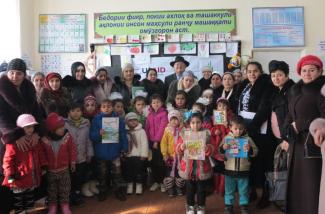The United States was among the first countries to welcome the independence of Kazakhstan, the Kyrgyz Republic, Tajikistan, Turkmenistan, and Uzbekistan and has worked consistently over the last three decades to support the security, development, and prosperity of each of these countries. Central Asia has always been the strategic and commercial crossroad of civilizations between Europe and Asia. The United States’ primary strategic interest in this region is to build a more stable and prosperous Central Asia that is free to pursue political, economic, and security interests with a variety of partners on its own terms; is connected to global markets and open to international investment; and has strong, democratic institutions, rule of law, and respect for human rights. A stable and secure Central Asia contributes directly to U.S. efforts to counter terrorism, support regional stability, promote energy security, and enhance economic prosperity in the region and beyond.
USAID’s programs in Central Asia began shortly after the region’s independence from the Soviet Union, a partnership now in its third decade. Initially, our programs focused on three main “transitions:” one involving an economic transition toward more market-based economies; a second supporting a political transition toward more effective, transparent, and democratic governance; and a third promoting sustainable approaches in the social sectors, especially in health and education.
Today, our programs aim to constructively engage with Central Asia, an opportunity informed by our past experiences. With the launch of the 2019-2025 United States Strategy for Central Asia, USAID is capitalizing on the openings created by new leaders in the region for reform-oriented development, intraregional connectivity and cooperation, and greater U.S. engagement. Improvements in interregional relationships and a growing appreciation of the value of working together as a regional group is expanding the potential for U.S. engagement through the C5+1 platform. This includes promoting private-sector engagement and transparent government policies and regulations that foster adherence to international standards, including environmental safeguards.
Although the United States is not the only influential international player in this region, through a combination of country-specific and regional programs, we can offer each of the countries in the region a combination of balance as well as alternate possibilities that provide a much wider range of choices and prospective paths forward.

USAID
